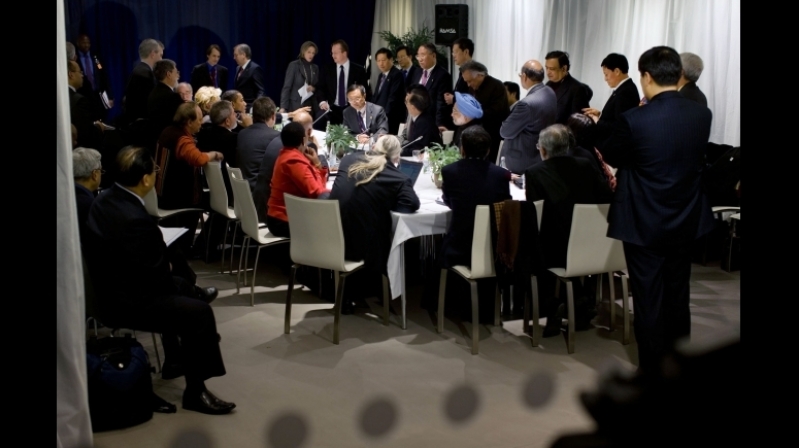
Delegates at the U.N. Climate Change Conference in Copenhagen, Denmark, concluded their historic two-week gathering Saturday with a nonbinding "Copenhagen Accord" that signals a new start for rich-poor cooperation on climate change but falls short on concrete steps against the global phenomenon.
It's "an impressive accord," U.N. climate chief Yvo de Boer said of the three-page document.
"But it's not an accord that is legally binding, not an accord that pins down industrialized countries to targets," he acknowledged to reporters.
CIDSE and Caritas Internationalis, the world's largest alliance of aid and development agencies, meanwhile, called the proposed deal “weak and morally reprehensible” as well as one that could spell disaster for millions of the world’s poorest people.
“People in developing countries are already struggling with the effects of climate change. We only have a short window of opportunity to prevent even worse to come,” commented Niamh Garvey of CIDSE member Trcaire/Caritas Ireland from the Bella Center.
“The deal put forward in Copenhagen fails to provide the commitments that the science says is required,” she added. “Millions of people are now fighting to keep their heads above water while political leaders stall.”
Under the “Copenhagen Accord,” nations agreed to cooperate in reducing emissions, "with a view" to scientists' warnings to keep temperatures from rising more than 2 degrees Celsius (3.6 degrees F) above preindustrial levels.
The deal also commits developing nations to report every two years on their voluntary actions to reduce emissions and commits richer nations to finance a $10 billion-a-year, three-year program to fund poorer nations' projects to deal with drought and other climate-change impacts, and to develop clean energy.
Notably, however, while the accord includes a method for verifying each nation's reductions of carbon dioxide and other heat-trapping gases, it does nothing to demand them.
Furthermore, as CIDSE and Caritas Internationalis pointed out, while all 193 nations expressed a willingness to continue working, the proposed deal itself presents no clear time line for concluding a fair ambitious and legally binding agreement in the coming months.
"It is inconceivable that with more than 100 world leaders gathered together in one room to make a pact to solve a global problem, they have failed to commit themselves to adequate and binding obligations,” said CIDSE Secretary General Bernd Nilles.
“They can call it an historical accord, a declaration, whatever they like. The reality is that leaders have failed to deliver a concrete and effective solution; they have passed up this historical opportunity to set a clear and collective pathway to a sustainable future,” Nilles added.
A legally binding international agreement requiring further emissions cuts by richer nations was the goal in Bali, Indonesia, in 2007 when the annual U.N. conference set a two-year timetable leading to Copenhagen.
A new pact would succeed the first phase of the 1997 Kyoto Protocol, which expires in 2012.
Under Kyoto, 37 industrial countries are required to cut 1990 emissions levels a total 5 percent by 2012, and based on the declarations from wealthy countries before the meeting in Copenhagen, the World Wildlife Fund for Nature estimated the total emissions cut would amount to 10 percent by 2020.
Some scientists, however, say industrialized nations must cut emissions by 25 to 40 percent from 1990 levels by 2020 to prevent climate disasters, such as coastal flooding from rising sea levels, severe weather events, and variations in rainfall and temperatures that will affect agriculture and wipe out species of plants and animals.
In their remarks Saturday, CIDSE and Caritas said they believe the world must accept nothing less than a fair, ambitious and legally binding agreement that commits developed countries to greenhouse gas emissions cuts of more than 40 percent by 2020, based on 1990 levels.
The alliance said it also wants to see wealthy nations provide $195 billion in funding by 2020 – on top of existing aid commitments – to help developing countries harness green technologies and protect themselves from the worst impacts of climate change.
"Leaders may be lagging behind, but the level of commitment shown by people from all over the world in the run up to Copenhagen has shown unequivocally that the public is firmly behind a strong climate change deal. Leaders must now set a firm deadline for coming to a comprehensive and binding agreement as soon as possible in the coming months, and we’ll be watching them every step of the way,” said Lesley Anne Knight, Secretary General of Caritas Internationalis.
Caritas Internationalis, the largest network of Catholic charities in the world, works through its 164 national members to combat poverty and injustice, directly helping around 24 million people each year in 200 countries and territories.
CIDSE, meanwhile, is a Catholic network of 16 member organizations in Europe and North America that share a common strategy in their efforts to eradicate poverty and establish global justice. CIDSE’s advocacy work covers global governance, resources for development, climate change, trade and food security, EU development policy and business, and human rights.







